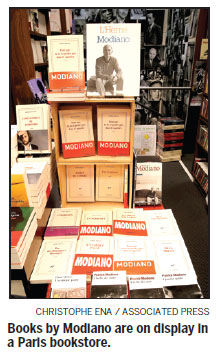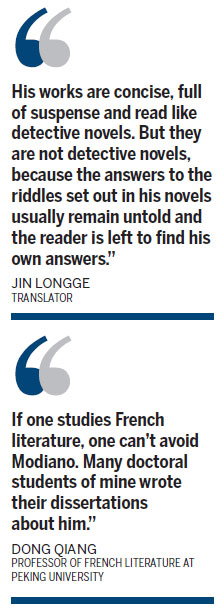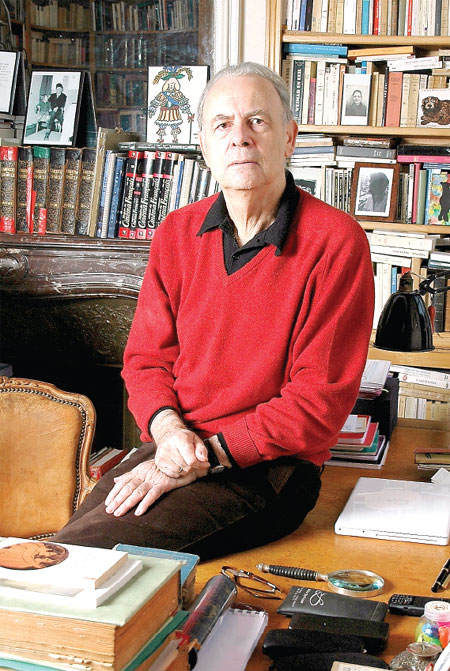Winning words
Updated: 2014-10-15 08:28
By Xing Yi(China Daily)
|
||||||||
Nobel laureate Patrick Modiano has plenty of fans among the Chinese literati, Xing Yi reports.
Compared to Japanese novelist Haruki Murakami, who enjoys a wide readership in China and is a perennial favorite for the Nobel Prize for literature, the newly minted laureate Patrick Modiano seems less-known among general Chinese readers. But the French writer is held in high esteem by the literary circles, who believe that the Modiano's win is well-deserved if unexpected.
Dong Qiang, a professor of French literature at Peking University, told the media that since Modiano has been a celebrated writer in France, it's not a surprise that he won the prize. What surprised him was that a French writer was awarded the Nobel, since it was only six years ago that another French writer, Le Clezio, took the prize. The Swedish Academy is known for spreading the literature prize to authors from different countries.
"If one studies French literature, one can't avoid Modiano," Dong says. "Many doctoral students of mine wrote their dissertations about him."
Born in a western Paris suburb in July 1945 - two months after World War II ended in Europe - Modiano spent most of his life in France and studied at Lycee Henri-IV in Paris, the top preparatory school in France. His geometry teacher there was Raymond Queneau, a writer who was a major influence on him.
In the first interview Modiano gave after winning the Nobel, he explained that writing for him is a natural thing that he started quite young: "It's something that's been part of my life since the beginning."
Modiano has published about 30 works, including novels, film scripts and children's books, since his first book, La Place de l'etoile, in 1968.
Modiano's works focus on the occupation of France during the World War II, and invite the reader to seek identity through memory and history.
The citation of the Swedish Academy says: "He has evoked the most ungraspable human destinies and uncovered the life-world of the occupation."
Jin Longge, who has translated three books by Modiano into Chinese, says: "His works are concise, full of suspense and read like detective novels. But they are not detective novels, because the answers to the riddles set out in his novels usually remain untold and the reader is left to find his own answers."
Jin won the Fu Lei Translation and Publishing Award, a top French-Chinese literary translation award in China, for his translation of Modiano's novel Dans le cafe de la jeunesse perdue (In the Cafe of Lost Youth) in 2011.
The French author's works were introduced into China in the 1980s by several literary journals, and there was a Modiano craze among Chinese literature lovers in the late 1980s and early '90s.
The late renowned novelist and essayist Wang Xiaobo (1952-97) held Modiano's work in high regard. In an article titled The Art of Fiction, Wang wrote: "The contemporary novelists who have made the greatest achievements are Italo Calvino, Marguerite Yourcenar, Gunter Wilhelm Grass, Patrick Modiano and Marguerite Duras ..."
Wang's novel Wanshou Temple tells a story that is not unlike Modiano's Rue des Boutiques Obscures (Missing Person), in which the main character loses his memory and then seeks his identity through the words he has written before.
Since Wang cites Missing Person in his first line of Wanshou Temple, many of his readers came to know of Modiano and started to read his works.
In the past three decades, about 15 books by Modiano have been translated into Chinese, and three titles are still selling, according to a staff member at Sanlian Bookstore in Beijing. But these books were sold out the day after it was announced that Modiano had won the Nobel.
Huang Yuhai, chairman of the board of Shanghai 99 Readers, told the media that his company plans to reprint at least 100,000 copies of the translated version of Dans le cafe de la jeunesse perdue, a rough estimate based on orders from bookstores and online retailers.
Shanghai 99 Reader holds the copyright to nine of Modiano's books in China. According to Huang, the reprint of Modiano's Prix Goncourt prize-wining novel Rue des Boutiques Obscures will be ready in late October, and the Chinese version of other titles such as Modiano's debut novel La Place de l'etoile will be published in the coming months.
Contact the writer at xingyi@chinadaily.com.cn
|
French novelist Patrick Modiano has won the 2014 Nobel Prize for Literature. Associated Press |


(China Daily 10/15/2014 page19)

 Premier Li arrives in Rome for official visit to Italy
Premier Li arrives in Rome for official visit to Italy
 Universal to open theme park in Beijing
Universal to open theme park in Beijing
 Child bride 'marries' 37-year-old
Child bride 'marries' 37-year-old
 New York celebrates 70th Annual Columbus Day
New York celebrates 70th Annual Columbus Day
 HK police vow minimum force to remove protest road barriers
HK police vow minimum force to remove protest road barriers
 China, Russia sign deals on energy, high-speed railways
China, Russia sign deals on energy, high-speed railways
 Future of US-China movies to be discussed
Future of US-China movies to be discussed
 Chinese art troupe displays power to overcome obstacles
Chinese art troupe displays power to overcome obstacles
Most Viewed
Editor's Picks

|

|

|

|

|

|
Today's Top News
Taiwan photographer depicts NYC on grand scale
Premier Li arrives in Rome for official visit to Italy
Chinese tourists rank US No 3 spot
Alibaba set to expand 'double 11'
Costco joins Alibaba's online portal
Kim makes first public appearance in 40 days
HK police vow minimum force to remove protest road barriers
Ferguson protesters struggle to keep focus on slain teenager
US Weekly

|

|








